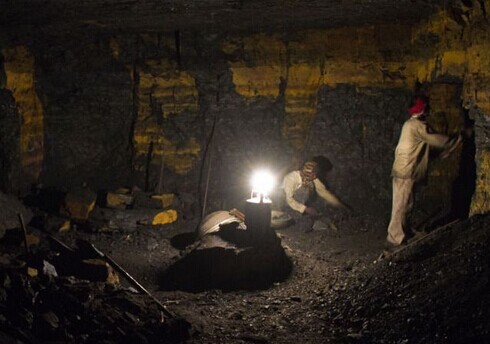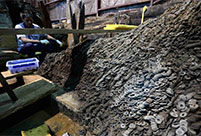

 |
BEIJING, Nov. 20 -- A sizable share of coal samples collected from Beijing, Tianjin and Hebei in north China failed to meet pollution control requirements, the Ministry of Environmental Protection (MEP) said on Friday.
The MEP has tested 203 samples during an inspection on coal quality at 185 coal sales outlets and 10 coal-firing central heating stations across the Beijing-Tianjin-Hebei region.
More than 22 percent of samples from Beijing contain excessive pollutants (volatile phenol not tested). The share rose to 26.7 percent for Tianjin and 37.5 percent for Hebei, the MEP said.
Inspectors also discovered high sulfur content, up to 2.1 percent, in coal at four sales outlets in Binhai New Area in Tianjin, and high content of ashes, up to 30 percent, at two outlets in Hebei Province.
Total sulfur refers to the entire composition of organic and inorganic sulfur in coal. Sulfur, after burning, will become sulfur dioxide which is a major pollutant.
Coal ash, waste material left after coal is burned, contains various heavy metals, many of which are toxic.
Of the 10 inspected heating stations, seven failed to meet coal quality standards. A heating company in Tangshan city of Hebei was found to use coal containing 1.33 percent total sulfur and 29.22 percent ashes. Three in Baoding city were found to burn coal consisting of more than 20 percent ashes.
Coal burning is considered one of major contributors to frequent smog in China, especially when northern China turns on central heating in the winter.
 J-10B fighters with homegrown engine in test fligh
J-10B fighters with homegrown engine in test fligh Photos of U.S. Navy intruding in South China Sea released
Photos of U.S. Navy intruding in South China Sea released Cats who immediately regretted their life choices in photographs
Cats who immediately regretted their life choices in photographs Beautiful girl from police college becomes Internet hit
Beautiful girl from police college becomes Internet hit 10 tons of copper coins unearthed in 2,000-yr old tomb
10 tons of copper coins unearthed in 2,000-yr old tomb In Pics: Amazing Chinese fighters
In Pics: Amazing Chinese fighters
 Chinese, U.S. navies hold first-ever joint exercise in the Atlantic
Chinese, U.S. navies hold first-ever joint exercise in the Atlantic When a Chinese woman marries an Indian man
When a Chinese woman marries an Indian man Photos of beautiful teacher hit the Internet
Photos of beautiful teacher hit the Internet Top 20 hottest women in the world in 2014
Top 20 hottest women in the world in 2014 Top 10 hardest languages to learn
Top 10 hardest languages to learn 10 Chinese female stars with most beautiful faces
10 Chinese female stars with most beautiful faces China’s Top 10 Unique Bridges, Highways and Roads
China’s Top 10 Unique Bridges, Highways and Roads A traditional solution
A traditional solution Unwanted for marriage
Unwanted for marriage Joint efforts needed to shield citizens abroad
Joint efforts needed to shield citizens abroad Chinese employers up the ante for foreign hires
Chinese employers up the ante for foreign hiresDay|Week